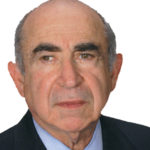2009 Honoree International DI Society W. Harold Petersen Lifetime Achievement Award.
2015 Honoree of NAILBA’s Douglas Mooers Award for Excellence.
With the help of Victor Cohen, this is the ninth part of our ongoing series with Eugene Cohen, founder of the Eugene Cohen Insurance Agency, Inc. From time to time, we will feature an interview with Eugene, who has dedicated over 58 years of his life to learning, teaching, and supporting brokers in the agency’s quest to help consumers protect their incomes from the tragic effects of a disability.
Disability insurance (DI) is one of those products that can change the trajectory of an individual and a family’s life and is crucial for every financial planner and insurance professional to learn about and offer to clients.
Victor: Eugene, I have heard you say there are four different types of DI prospects.
Eugene: That’s right. There is DI Prospect Type 1: The client who has no DI coverage, which is a very common occurrence in the marketplace. This is the client who we are going to focus on in this conversation. The other clients include DI Prospect Type 2: The client with only employer provided group long-term disability. There is also DI Prospect Type 3: The client who only has individual disability insurance. And finally, there is DI Prospect Type 4: The client who has both group LTD and their own individual disability insurance policy.
Remember, in a previous conversation we talked about the four objections an advisor may face when talking about DI with a client?
Victor: Yes. No money. No hurry. No confidence. No need.
Eugene: The “no need objection” is the most important objection to overcome when talking with the client who does not have DI. No one will get anything they think they don’t need. So, we have to support the client’s ability to uncover the need.
Victor: How do you do that?
Eugene: By asking questions.
Victor: What kind of questions?
Eugene: You can ask the client, “What is the longest vacation you have ever taken?” The client usually will say one or two weeks. Then you can ask the client, “Why don’t you ever take a three or four month vacation?” They’ll probably say, “I have a job or I have to work.”
Ask the client to imagine if they had an accident or sickness that took them out of work for two, three or four years. Ask the client, “Would you have an income problem, being off work that long?” The client will usually say yes.
You can also ask the client, “If you had a money printing machine producing thousands of dollars every year, would you insure it?” Your client’s ability to earn an income is that money printing machine. Current and future income is usually your client’s most valuable asset.
Victor: So, let’s say the client sees the need for DI. Where do you go next in the conversation?
Eugene: Best for you and the client to do a quick accounting of the client’s non-cancellable and/or fixed monthly obligations. The monthly mortgage payment. Let’s assume that’s $3,000 per month. Taxes on the property…$500 per month. Food for the family. We’ll use a low figure of $500 monthly. Utilities, $200 per month. Car payments, some other recurring monthly expenses…let’s assume the client’s non-cancellable monthly obligations total about $5,000 per month.
Remember, the client wants to pay their DI policy premium with after tax dollars so the benefits will be tax free.
Also, the company may limit the monthly benefit amount the client may purchase, based on the client’s income—per the company’s issue and participation limits. If someone is earning $100,000 per year, the maximum monthly benefit they may get is often around $5,100. Many of the companies have very similar issue and participation limits.
Victor: So, what is the next step in the conversation?
Eugene: Now the producer would go over the different benefits available in a DI policy. Let’s assume the client wants a benefit period to cover sickness and accidents to age 65 and they also want a 90-day elimination period.
The client wants a liberal definition for total disability for their occupational class and they also want a partial/residual disability rider, a cost-of-living rider, and a type of future purchase option (FPO). The FPO would give the client the opportunity to increase coverage at a later date without medical underwriting, subject to the contract definitions and financial underwriting. Each company has their own rules and guidelines.
Once the producer has gone over the benefits, then the producer needs to manage the client’s expectations regarding underwriting. Remember, not everyone who applies for a DI policy can get one. In some cases, a company can offer a policy with modifications.
Most individual disability applications require medical underwriting. The producer should ask questions about the client’s health history. Let’s say the client says they take medications for anxiety or mild depression. Perhaps the client also shares that they see a chiropractor six times per year to treat pain in their lower back.
While a producer isn’t the underwriter, we can let this client know that our experience has shown us that due to the client’s mental health and lower back history, they may get an exclusion for mental health coverage and/or an exclusion on the lower back. In addition, the underwriter can modify the benefit period offered and/or the elimination period being offered.
In this example there are no surprises. Maybe a few weeks or more after submitting the application, the DI policy is issued with a benefit period to age 65—as applied for. But the client did get an exclusion rider on the lumbar spine and they are given an exclusion for mental coverage.
Now when the producer delivers the policy, the producer should review all the great benefits the client is getting with the policy in addition to reviewing the exclusions. The producer should remind the client that there is still an amazingly long list of potential illnesses and injuries that the policy covers.
Victor: This has been another great conversation. Thank you so much. Anything else you’d like to add?
Eugene: We must remember, we are helping the client and the client’s family. If that individual has a disability, the producer has done a fantastic job uncovering the need and softening some of the financial problems that a long term disability can present.





























